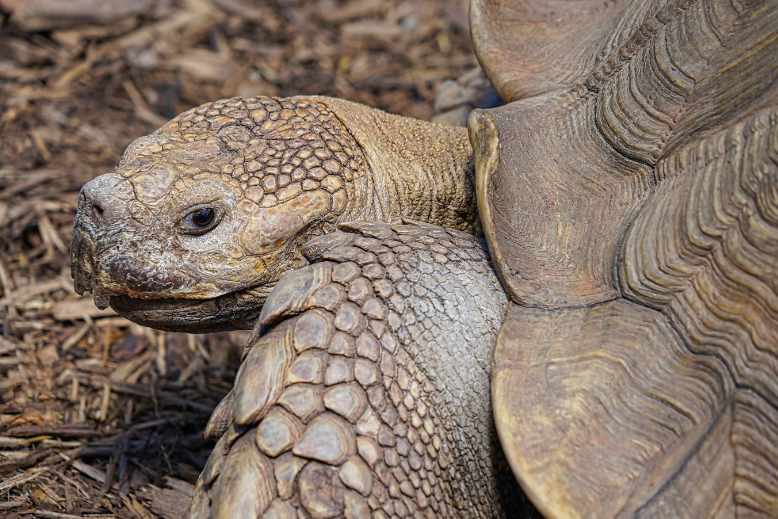Do tortoises get lonely? No, they don’t! Unlike humans and other social animals, tortoises don’t necessarily feel the need for any companionship, so they don’t get lonely. In the wild, they prefer living solitary lives and spend most of their time alone.
Although tortoises do come together for breeding purposes, these reptiles like to be loners most of the time. Mother tortoises may look out for their nest, but they don’t raise or protect the hatchlings. That means even juvenile tortoises learn to survive on their own.

Many tortoise owners like to believe that their pet tortoises have human-like needs. While this belief isn’t necessarily flawed, it can introduce naive tortoise keepers to some misconceptions about the preferences of their beloved pet. Therefore, it isn’t unwise to know what your pet tortoise does and doesn’t need to thrive in captivity.
Do tortoises get lonely?
Tortoises don’t get lonely and certainly not in the way we humans deem of it.
Wild tortoises are foragers by nature. You can think of them as loners who have nothing to do with the interest of others. These cold-blooded reptiles spend most of their days hiding in their self-constructed burrows. The only interaction you can imagine between two wild tortoises is mating. They even don’t stick around to nurse their young ones.
Female tortoises prepare their nests, lay eggs, and move on. When there is no love between mother and hatchling, it’s pretty unlikely that there will be any affection in other tortoise relationships.
So how come my tortoise seems glad to see me?
While tortoises are not the most social pets out there, most of them do recognize their owners. These cold-blooded pets become familiar with their caregivers and remember them. But make no mistake as their eagerness to see you can be just because of the fact that you feed them. And they are aware that without you, their life can be cut drastically short.
Generally, tortoises are not emotional creatures, but they can get attached to their owners. Your pet tortoise may approach you and ask for a neck rub with closed eyes to show that your contact is comforting to them. Your continuous care may evoke some feelings of companionship in your pet tortoise. But of course, we can’t be sure!
Do tortoises need companions?
Just like many other reptile pets, tortoises don’t have a built-in need for companionship. These pattered creatures are perfectly fine on their own in the wild. Our pet tortoises aren’t much different from their wild counterparts, so they, too, are not much into companionship.
Anyhow, some pet tortoises can learn to live in a peaceful environment with other tortoises of their species. Few of them even seem to like spending time with another tortoise.
Since every tortoise has a distant personality, it is hard to say that your pet will appreciate a tank mate. We suggest considering your tortoise’s temperament before thinking about another pet.
Should I keep two tortoises?
As a caring tortoise owner, you will want to give your pet the best living environment. So it is natural for you to think about whether it’s a good idea to add a buddy to your tortoise’s aquarium. Though tortoises are built for solitary living, your pet might enjoy having a new friend depending on the temperament.
But before you start flooding new tortoises in your shelled friend’s tank, keep the following factors in mind:
- Male tortoises can get into fights
If kept alone, male tortoises are most likely to get into scuffles. Plus, if your enclosure isn’t big enough or has a low male-to-female ratio, males will definitely get into battles for mating purposes. They are territorial, and this behavior isn’t something that can be worked out with training.
On the assumption that you wanted to get companions for your pet tortoise, consider having more females. If you’re going to keep many tortoises, get one male and two or more females. Just be sure that the ratio of female tortoises is enough to go around for the male ones, and things will be fine.
That being said, prepare yourself for bullies. No matter the ratio of females in the tank, some male tortoises can be mean to other males. They can show signs of aggression. In that case, it is wise to keep the aggressive one separated from other tortoises. The fella is just not a social animal!
- Avoid mixing species
Some tortoise species have certain kinds of parasites and organisms on them. These parasites don’t harm certain tortoise species but can be deadly for other breeds.
It’s best not to combine different tortoise species together. Even if you are sure that all of your tortoises are parasite-free, mixing two or more tortoise species in a single tank is still a no.
- Provide lots of space

Think of tortoises as your introverted friends. They like other fellows to spend some time with them, but they need lots of space and rest before another contact.
Tortoises are the same when it comes to interactions. They like to stay reserved. Too much fellowship can make them cranky.
If you want to house your small tortoise together, make sure there is plenty of room for everyone to maintain some personal space. You may need to opt for the most extensive enclosure available at your nearest pet mart. The tank needs to have multiple hideouts and lots of space where your tortoises can get a breath.
- Don’t force interactions.
Some newbie tortoise keepers consider tortoises as toddlers. Sorry to burst the bubble, but they aren’t! Tortoises don’t need to learn social skills to survive in the great outdoors. You can’t push your shelled pet to go make friends.
You should never pressurize your tortoise to spend time with another tortoise. If your pet likes being social, it will do it on its own.
Forcing two tortoises to interact without their will is simply a call for disaster. Even the friendliest tortoise can be aggressive while being forced to interact.
Just let your tortoises make new friends on their own. Companionship, or at least tolerance, takes some time to develop, even for your cold-blooded pets.
- Provide enough food
Captive tortoises only thrive on the food offered by their owners. Therefore owners should provide enough food for each tortoise in the enclosure. In fact, it is wise to offer more than enough food to go around.
You may be wondering why it is good to have leftovers. Well, the logic is simple. Your pets may get aggressive if they feel the food isn’t enough to satisfy everyone. You probably don’t want to see your tortoises battling over food because this bad habit is challenging to break once set.
Though tortoises are not terribly notorious for food aggression, it is still possible. Try your best to prevent this habit by providing everything your pets need. Don’t mind offering some extra to keep everyone happy.
- Consider personalities
People who have never had a tortoise before will probably mock this, but these patterned creatures have unique personalities! Some are outgoing and playful, while others prefer to stay reserve and watch what’s happening around them. Some love socializing with humans and other animals, while others like not to be bothered.
Don’t match your energetic pet tortoise with a grumpy grandpa. Consider their personalities before making them live together, so no one annoys the other.
- Match Sizes
Remember when the school bully was considered the biggest in the class? That belief pretty much holds true for the tortoise Kingdom. While your biggest tortoise may not be the one who starts the fight, he might be the one who ends it.
Sadly, such situations can deteriorate the health of the small tortoise in the tank. The little ones may get injured, stressed, or can even die.
Owners should do their best to avoid mixing tortoises having different sizes. It might be challenging to match the sizes perfectly as we can’t predict how fast each tortoise will grow. But do your best to keep the same sized tortoises together.
- Keep in mind that it may not work.
Even though you are doing everything right, some tortoises may not thrive together. You can provide tons of extra space, an excessive amount of food and water, and lots of hideouts; still, it may not work. You need to accept the fact that not every tortoise can live with others harmoniously.
Keep in mind that tortoises are evolved as loners. They are considered solitary animals for some pretty good reasons. It won’t be wise for tortoise keepers to bunk these venerable creatures together in colonies or groups. Forcing interactions may stress the pets out, and your tortoise-keeping experience can be a disaster.
Now we are not saying that you shouldn’t give it a try, but be prepared to handle the additional responsibilities. Be ready to remedy a terrible situation. Also, do not put two tortoises in a tank if you cannot separate them immediately if things don’t go as planned.
Do tortoises get bored?

Tortoises are highly explorative. They don’t get lonely, but it is natural for them to experience boredom in an unstimulating lifestyle. Tortoise parents need to regularly check up on their gentle pets to ensure that the tortoises don’t have any dull moments that can negatively impact their behavior.
These patterned pets are slow, for sure. However, they are highly engrossed in their environment and simply love to explore exciting stuff.
How to tell if tortoises are bored?
Your pet reptile is bored if it starts showing some destructive behaviors such as scratching the enclosure, turning water and food bowls upside down, tearing the decorations, and attempting to flee from the tank.
Tortoises tend to release their boredom by doing something different than their tiresome routine. That’s where the destruction mode activates.
Your bored pets me turn the enclosure into a big mess by disorganizing everything in there. They may start digging up the decorations to release their excess energy.
As soon as you notice your tortoise scratching its enclosure and trying to dig everything out, be sure that they aren’t enticed with their environment anymore. It’s time to level up the enclosure!
How to save a tortoise from boredom?
Here are a few things that you can do to prevent your tortoise from getting bored.
- Keep the enclosure interesting and comfortable for the tortoise to enjoy.
- Make sure the aquarium is big enough for the reptile to move around. The enclosure shouldn’t be less than 4×2 feet. If you can provide a bigger one, go for it.
- Tortoises require ample space to explore around and satisfy their curiosity.
- These pets love to dig, so don’t forget to add a moderate amount of substrate to the tank.
- Tortoises are picky eaters. You may need to offer a varied diet to entice the taste buds of your fussy eater.
- Wild tortoises travel for miles to search for food. So tortoise owners need to understand the importance of exercise or their tort.
- These independent pets may get bored if nothing exciting is in their cages. Adding plants, shells, and some tortoise toys to the tank is a nice way to keep your tort entertained.
Commonly Asked Questions
Do tortoises get lonely?
Loneliness is the absence of company. These solitary creatures don’t require any company. As long as they have food, water, shelter, and independence to do everything they want, they can survive. These pets don’t form a deep attachment to anyone or anything. Thereby loneliness isn’t something that can bother them.
Can I keep two tortoises together?
You indeed can, but your tortoises may not enjoy this. While it’s ok to add two female tortoises together, leaving two males alone in an enclosure isn’t a wise move.
Does my tortoise seek friends?
No, tortoises don’t seek friends. Some of these pets may enjoy having a tank pal around, but not every tortoise is a fan of togetherness.




